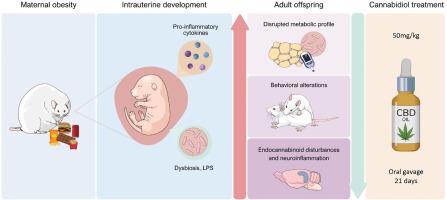Cannabidiol partially rescues behavioral, neuroinflammatory and endocannabinoid dysfunctions stemming from maternal obesity in the adult offspring
IF 4.6
2区 医学
Q1 NEUROSCIENCES
引用次数: 0
Abstract
Maternal obesity is known to increase the risk of psychiatric disorders, such as anxiety, depression, schizophrenia and autism spectrum disorder in the offspring. While preventive measures are well-documented, practical approaches for addressing the damages once they are already established are limited. We have recently demonstrated the interplay between maternal obesity and treatment with cannabidiol (CBD) on neuroinflammation and peripheral metabolic disturbances during adolescence, however, it is known that both factors tend to vary throughout life. Therefore, here we investigated the potential of CBD to mitigate these alterations in the adult offspring of obese dams. Female Wistar rats were fed a cafeteria diet for 12 weeks prior to mating, and during gestation and lactation. Offspring received CBD (50 mg/kg) for 3 weeks from the 70th day of life. Behavioral tests assessed anxiety-like manifestations and social behavior, while neuroinflammatory and endocannabinoid markers were evaluated in the hypothalamus, prefrontal cortex (PFC) and hippocampus, as well as the biochemical profile in the plasma. CBD treatment attenuated maternal obesity-induced anxiety-like and social behavioral alterations, restoring exacerbated astrocytic and microglial markers in the hypothalamus, PFC and hippocampus of the offspring, as well as endocannabinoid levels in the PFC, with notable sex differences. Additionally, CBD attenuated plasma glucose and lipopolysaccharides (LPS) concentrations in females. These findings underscore the persistent influence of maternal obesity on the offspring's health, encompassing metabolic irregularities and behavioral impairments, as well as the role of the endocannabinoid system in mediating these outcomes across the lifespan.

大麻二酚可部分缓解成年后代因母体肥胖而产生的行为、神经炎症和内源性大麻素功能障碍。
众所周知,母亲肥胖会增加后代患焦虑症、抑郁症、精神分裂症和自闭症谱系障碍等精神疾病的风险。虽然预防措施已得到充分证实,但在损害已经形成后,解决损害问题的实用方法却很有限。我们最近证明了母体肥胖和大麻二酚(CBD)治疗对青春期神经炎症和外周代谢紊乱的相互影响,但众所周知,这两个因素往往在整个生命过程中都会发生变化。因此,我们在此研究了大麻二酚缓解肥胖母鼠成年后代这些变化的潜力。雌性 Wistar 大鼠在交配前、妊娠期和哺乳期喂食食堂饮食 12 周。后代从出生后第 70 天开始连续 3 周服用 CBD(50 毫克/千克)。行为测试评估了焦虑样表现和社交行为,同时评估了下丘脑、前额叶皮质(PFC)和海马的神经炎症和内源性大麻素标记物,以及血浆中的生化概况。CBD治疗减轻了母体肥胖引起的焦虑样和社交行为改变,恢复了后代下丘脑、前额叶皮质和海马中加剧的星形胶质细胞和小胶质细胞标记物,以及前额叶皮质中的内源性大麻素水平,并存在明显的性别差异。此外,CBD还能降低雌性血浆葡萄糖和脂多糖(LPS)的浓度。这些研究结果强调了母体肥胖对后代健康的持续影响,包括代谢异常和行为障碍,以及内源性大麻素系统在整个生命周期中介导这些结果的作用。
本文章由计算机程序翻译,如有差异,请以英文原文为准。
求助全文
约1分钟内获得全文
求助全文
来源期刊

Neuropharmacology
医学-神经科学
CiteScore
10.00
自引率
4.30%
发文量
288
审稿时长
45 days
期刊介绍:
Neuropharmacology publishes high quality, original research and review articles within the discipline of neuroscience, especially articles with a neuropharmacological component. However, papers within any area of neuroscience will be considered. The journal does not usually accept clinical research, although preclinical neuropharmacological studies in humans may be considered. The journal only considers submissions in which the chemical structures and compositions of experimental agents are readily available in the literature or disclosed by the authors in the submitted manuscript. Only in exceptional circumstances will natural products be considered, and then only if the preparation is well defined by scientific means. Neuropharmacology publishes articles of any length (original research and reviews).
 求助内容:
求助内容: 应助结果提醒方式:
应助结果提醒方式:


